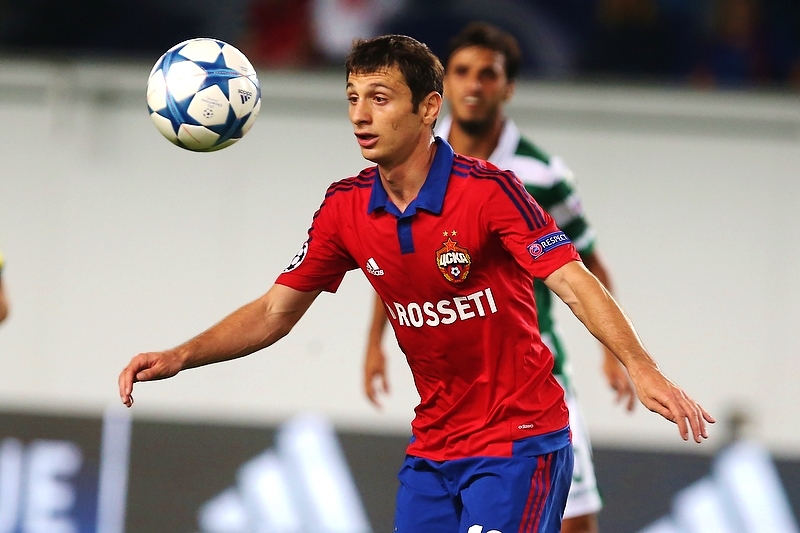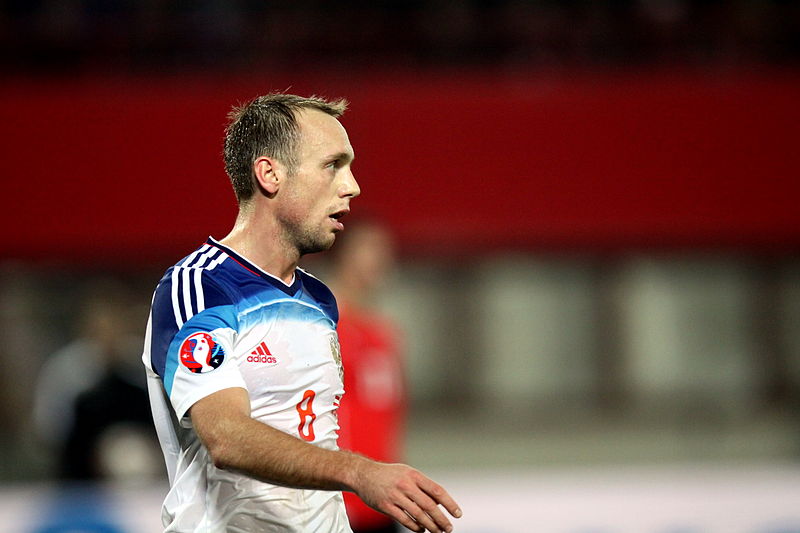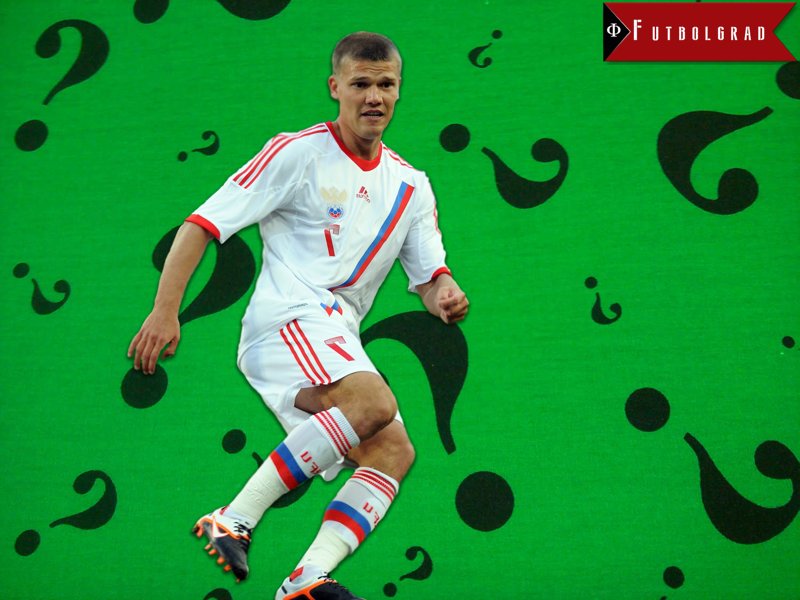Manuel Veth –
It has been a tough year for Russia’s Igor Denisov, as the defensive midfielder was part of the Dinamo Moscow squad that has been relegated for the first time in the club’s history. Hence, Denisov hoped that he could use the European Championships in France not only to forget the woeful season, but also to play himself into the spotlight for a potential new club.
This plan seemed to be right on track, as the Sbornaya’s (as Russia’s national team is often called) Leonid Slutsky envisioned a central role for the midfielder throughout the tournament. Denisov was especially important, because the team had already lost the highly talented Alan Dzagoev due to a broken foot sustained in CSKA Moscow’s last game of the season against Rubin Kazan.
Igor Denisov was Thought to be One of Two Central Midfielders in Slutsky’s Formation
Denisov was thought to be one of the two defensive midfielders in Slutsky’s 4-3-3 formation, which often can look like a 4-2-3-1, and was thought to be especially important for Russia’s defensive stability in midfield.
Then, on Sunday against Serbia, which was Russia’s last official test before the European Championships, Denisov limped off with a thigh injury and, as a result, will miss the entire tournament in France.

Slutsky has to now replace both Alan Dzagoev (pictured) and Igor Denisov – Image via soccer.ru
Slutsky stated after the match, “We just started rebuilding after the Dzagoev injury, and now we have to rebuild again after the Denisov injury, only this time we will not have any friendlies to prepare the team.” But Slutsky was adamant that the team was ready for the challenges it faces: “These difficulties will only bring our team together, and we will be playing with even more enthusiasm.”
Who Will Replace Denisov?
Now, however, the important question is: Who Slutsky will choose to replace Denisov in Russia’s starting formation when the Sbornaya kicks off the tournament against England on June 11 at the Stade Vélodrome in Marseille?
Russia has since called up Zenit Saint Petersburg midfielder Artur Yusupov to replace Denisov in the 23-men-squad. Yusupov was actually on holiday in Monaco, and was staying at the same hotel as the Russian national team. “I was supposed to fly back to Moscow today”, a surprised Yusupov told the Guardian. “I didn’t even have my football boots with me and none of the clothes that I needed.”
Yusupov further added, “This is just the way it happened. After being on holiday for 14 days, of course I am going to be a bit out of shape. I don’t really know what sort of physical condition I will be in.”
It is, however, likely that Yusupov’s call-up to the Sbornaya will simply result in an extended French fitness vacation for the Zenit midfielder, as Slutsky will most likely rely on other players to fill the void that Denisov has left.
The most likely candidate to replace Denisov would be the recently naturalized Roman Neustädter, who has effectively played this role at Borussia Mönchengladbach and at his current club Schalke 04. The problem with this solution, however, is the fact that Neustädter has just arrived at the team, and is not 100% familiar with his new teammates. Another problem is the fact that Neustädter often played as a central defender in the Bundesliga last season. Indeed, don’t be surprised if Neustädter, who is younger and more mobile than the established defenders Vasili Berezutski and Sergei Ignashevich, will start in central defence for Russia at the Euros.
Glushakov – The Most Obvious Option
The most obvious option as replacement for Denisov, according to Sports.ru, is Spartak Moscow defensive midfielder Denis Glushakov. Glushakov’s attributes as a defence first midfielder, who focuses mostly on destroying his opponents’ creative plays in midfield, indeed make him an obvious choice to replace Denisov. Glushakov is also strong at holding onto the ball, and is known to have a strong finish. Perhaps his only weakness is his aerial ability, which is an important factor for a defensive midfielder. Furthermore, Glushakov plays a more offensive role at Spartak Moscow, which means that he would have to adjust his play for the Russian national team.

Denis Glushakov – Image via Steindy
Glushakov as defensive midfielder also changes the structure of the team, as many expected the Spartak midfielder to take over the more offensive element of the holding midfielders. Hence, his role will now have to be filled by another player. One candidate would be the Krasnodar midfielder Pavel Mamaev.
During the second half of the 2015-16 Russian Football Premier League season, Mamaev has shown fantastic chemistry with striker Fedor Smolov, who won the golden boot with 20 goals (find his profile here) by providing the Krasnodar striker with a steady stream of assists. Mamaev’s problem, however, is the fact that Slutsky seems to prefer Artem Dzyuba as a central striker, which forces Smolov onto the wing. This, in turn, also means that the Sbornaya’s tactical static is hugely different from Krasnodar’s. Sport.ru also reported that Mamaev failed to impress the coaches in midfield and, as a result, will most likely not start for Russia against England.
Golovin – The Creative Option
Another option would be CSKA Moscow’s young attacking midfielder Aleksandr Golovin. Golovin has played 17 matches for Slutsky’s club team, CSKA Moscow, this season but the majority of his games were either played on the wing or as a playmaker. At the same time, however, Slutsky has used Golovin late in the game in order to salvage close encounters, as the young midfielder is extremely strong in backtracking, which makes him an asset in a defensive situation despite the fact that he is nominally an attacking player. This attribute, in particular, could make him a candidate for the central midfield role.
The fact that Golovin is only 20, is considered a cornerstone of Russia’s 2018 World Cup squad, and is a member of Slutsky’s CSKA Moscow, also means that there is a strong chance that the midfielder could be featured in the starting eleven during the tournament.
One thing is for certain, the injuries to Dzagoev, and later Denisov, mean that Slutsky will have to experiment in midfield. Past examples, however, have shown that injuries to key players are not necessarily a bad thing.
In 2010 Germany surprised the world as the team stormed to a third place finish despite, or maybe because of, the absence of superstar Michael Ballack. Without Ballack, the Nationalmannschaft, as Germans call their national team, became more unpredictable and produced a string of exciting results—including a 4-1 victory against England, and a 4-0 victory against Argentina. Of course, the situation is not entirely comparable, but Slutsky could very well decide to throw caution to the wind by fielding a more offensive minded squad that could be a surprise at the Euros.
Manuel Veth is a freelance journalist, and PhD candidate at King’s College London. Originally from Munich, Manuel has lived in Amsterdam, Kyiv, Moscow, Tbilisi, London, and currently is located in Victoria BC, Canada. His thesis is entitled: “Selling the People’s Game: Football’s transition from Communism to Capitalism in the Soviet Union and its Successor States”, and will be available later this year. Follow Manuel on Twitter @homosovieticus.




















COMMENTS